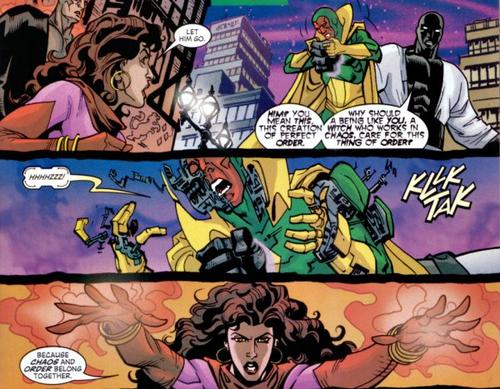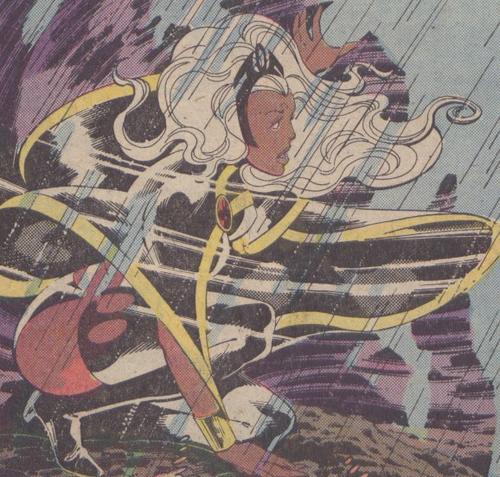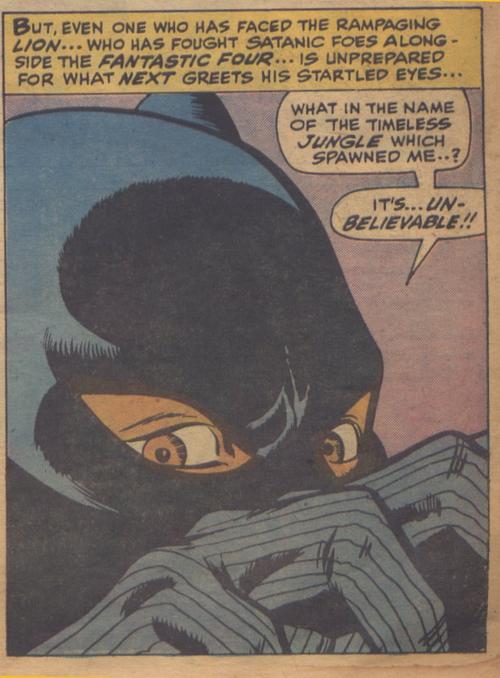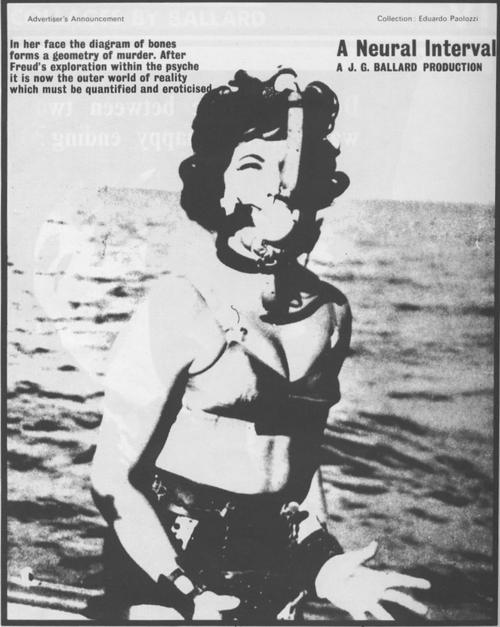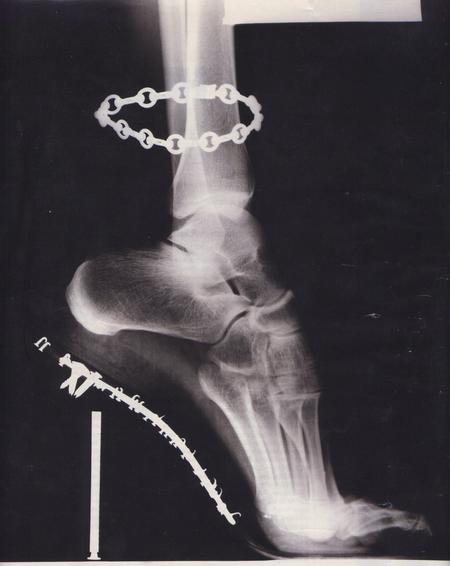June 28, 2005
Book meme
At least two people have asked me to do this, so here - at last - goes.
1) How many books do you own?
No way of knowing. Certainly can't count them and have no reliable way of calculating.
2) What was the last book you bought?
The Sex Appeal of the Inorganic, Mario Perniola. (You're sure to hear much more of this here very soon.)
3) What was the last book you read?
Read and finished: Michael Bracewell's England is Mine - disappointing and frustrating. There are flashes of insight but the organization of the book seems to change from chapter to chapter; at one moment the narrative is historical, the next it is thematic, and then regional. There is a sense of always just approaching the time when things are happening or just having missed it. Can't help thinking that Bracewell will benefit from a more focused subject matter, which is why still I'm looking forward to his Roxy book, due out later this year. (And there's way too much attention paid to Eng Lit: nothing will ever interest me in W H Boredom, for instance.)
Finishing: Houllebecq's Atmomised. No wonder Zizek likes this one. Is there a better savaging of desolate hippie hedonism and its pathetic legacy in New Age zen bullshit?
4)Five books that mean a lot to me.
(I hate all those surveys of best films/ books/ LPs which have the Latest Thing at the top, so I have only allowed myself to select books that have meant something to me for at least a decade.)
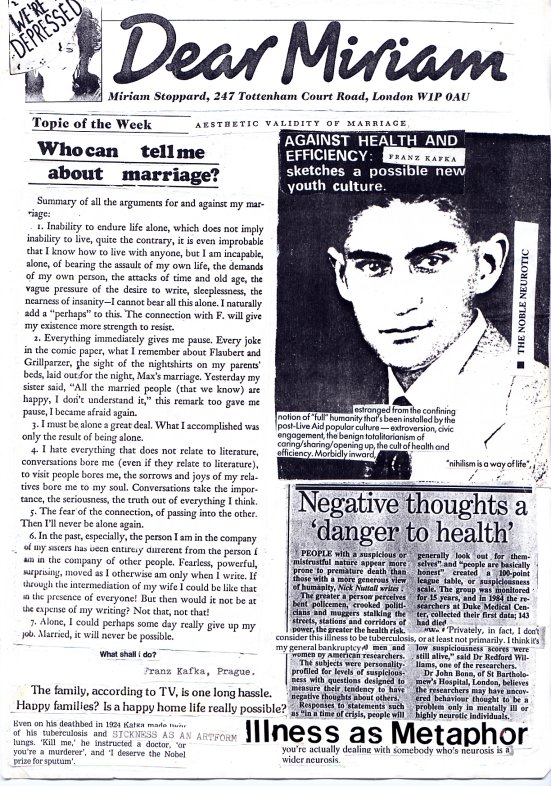
Kafka: The Trial, The Castle
Is it possible to reproduce, later in life, the impact that books, records and films have between the ages of fourteen and seventeen? The periods of my adult life that have been most miserable have been those in which I lost fidelity to what I discovered then, in the pages of Joyce, Dostoyevsky, Burroughs, Beckett, Selby... Any of those could have been selected, but I choose Kafka, because of all of them, it is he who has been the most intimate and constant companion.
I actually encountered Kafka first in a Penguin compendium of 'The Novels of Franz Kafka' that my parents, who knew very little about literature, bought me for Christmas because they 'thought it looked like my kind of thing'. So it proved.
It's difficult for me now to remember how I first received the text. Whether I initially enjoyed it or was frustrated by it I couldn't say. Kafka, after all, is a writer who doesn't waylay you. He invades subtly, slowly. I imagine that at the time I wanted and expected a more straightforward statement of existentialist alienation. Yet there was very little of that in Kafka. This was not a world of metaphysical grandstanding but a seedy, cramped burrow, whose ruling affect is not heroic alienation but creeping embarrassment. Physical force plays almost no role in Kafka's fictions - it is the ever-present possibility of social shaming that is the motive force of his winding non-plots.
Remember the pitiful scenes in The Trial when K, looking for the court in an office block, knocks in turn on each door, making the pathetic excuse that he is a 'house painter'? Kafka's genius consists in banalizing the absurdity of this: surprisingly, against all our expectations, it is indeed the case that K's hearing is taking place in one of the appartments in the building. Of course it is. And why is he late? The more absurd K thinks things are, the more embarrassed he becomes for failing to understand 'the ways' of the Court or of the Castle. The bureaucratic convolutions appear ridiculous and frustrating to him, but that is because he 'has not understood' yet. Witness the comedy of the opening scenes of The Castle, which are less an anticipation of totalitarianism than of call centres, in which K is told that the telephones 'function like musical instruments'. What kind of an idiot is he, if when he phones someone's desk, he expects them to answer? Is he so wet behind the ears?
It's not for nothing that Alan Bennett, the laureate of embarrassment, is an ardent admirer of Kafka. Both Bennett and Kafka understand that, no matter how absurd their rituals, pronunciations, clothes might appear to be, the ruling class are unembarrassable; that is not because there is a special code which only they understand - there is no code, precisely - but that whatever they do is alright, because it is THEM doing it. Conversely, if you are not of the 'in-crowd' nothing you can do could EVER be right; you are a priori guilty.
Atwood: Cat's Eye

A while back, Luke asked me what an example of 'Cold Rationalist' literature would look like. Atwood, with her reputation for coldness, is an obvious answer, but in truth, more or less all literature is cold rationalist. Why? Because it allows us to see ourselves as chains of cause and effect and thereby, paradoxically, to attain the only measure of freedom available to us. (Even Wordsworth, who admired Spinoza, described poetry as 'emotion recollected in tranquillity', i.e. not raw emotion expressed in some Dionysian ejaculation.)
Cat's Eye isn't my favourite Atwood novel - that would be the stark Surfacing - but it is the one that means most to me. I don't even remember all of the plot; what I will never forget are Atwood's horribly vivid descriptions of the the pitiless Hobbesian cruelty of teenage 'friendships'. They walk behind you so as they can criticise your shoes, the way you walk... They are worse than your worst enemies. The long days, the breakfast toast turning to cardboard in your mouth, the anxiety so sharp and constant that you forget it is there, no longer even register it.
Are your most formative years those of your early childhood or your early teens? Reading Cat's Eye in my early twenties was a kind of auto-psychoanalysis, a way out of the legacy of misanthropy, suppressed rage and cosmic sense of inadequacy that had been the legacy of my teenage years. Atwood's icy analysis beautifully demonstrated that the humiliations of those teenage years were a structural effect of teenage relationships, not at all anything specific to me.
Spinoza: The Ethics
Spinoza changes everything, but gradually. There is no 'road to Damascus' conversion to Spinozism, only a steady but implacable deletion of default assumptions. As with all the best philosophy, reading it is like running a Videodrome cassette: you think you are playing it, but it ends up playing you, effecting a gradual mutation of the way you think and perceive.
I'd been attracted to Spinoza as an undergraduate, but I only really read him at Warwick, under the influence of Deleuze. We spent over a year poring over The Ethics in a reading group. Here was a philosophy that was at once forbiddingly abstract and immediately practical, pitched at both the largest conceivable cosmic scale and the minutiae of the psyche. The 'impossible' bringing together of structural analysis and existentialism?
Ballard: The Atrocity Exhibition
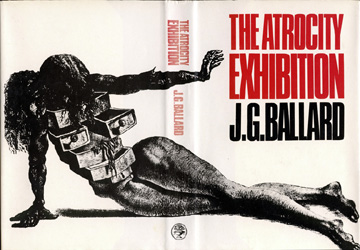
If Spinoza and Kafka were slow-acting, Ballard's impact was instant. He connected immediately with an unconscious saturated in media signal.
That was partly because I had in effect encountered Ballard long before I had actually read any of his work: in Joy Division (though more in Hannett's sound than in many of the lyrics; the song 'The Atrocity Exhibition', with its anguished pleading, couldn't be further from Ballard's dispassionate sobriety); in Foxx and Ultravox, in Cabaret Voltaire, in Magazine (big k-punk post coming up on them btw).
The Drowned World is the best of his disaster novels, inundated London as a literalized Surrealist landscape coolly surveyed by a latter-day Conrad, but it is The Atrocity Exhibition that is indispensable. Much more than the better-known Crash, The Atrocity Exhibition provided a conceptual and methodological repertoire for approaching the twentieth century assembled from the century's own resources. It is austerely modernist, making little concession to either plot or character, more like a fictive sculpture than a story, an obsessively repeated series of patterns.
Yes, Ballard has been accepted into the review columns, become an elder statesman, but let's not forget how different his background was from the standard Oxbridge man of letters. Ballard rescued Britain from Eng Lit, from 'decent' humanist certainties and Sunday supplement sleepiness.
Greil Marcus: Lipstick Traces

I've written before about the importance of this book to me. I read it when I had just finished university, no plans, the future collapsing into a grim attempt - bound to fail - to commensurate myself to the Thatcherite economic reality principle. Marcus' vast web of connections opened up an escape route. It was a description of a transhistorical Event, a break-out embracing anabaptists, situationists, dadaists, surrealists, punks. Such an Event was the exact opposite of the Grand Spectacles of the eighties, the scripted and organized Non events which played out on global television with Live Aid at their epicentre. It was fugitive, secret, even when - necessarily - massively collective. Lipstick Traces was sure that pop can only have any significance when it ceases to be 'just music', when it reverberates with a politics that has nothing to do with capitalist parliamentarianism and a philosophy that has nothing to do with the academy.
Lipstick Traces is itself best read as part of a textual rhizome which attempted to register, a decade or more on, the impact of punk. See also Vague magazine (if you are looking for one of the most powerful triggers for Ccru-style cyberpunk theory, check out Mark Downham's pieces in Vague), Savage's England's Dreaming. (This set not really complete until Rip It Up of course.)
5) Tag five people.
I can't think of one other blog that hasn't done this, so I'm stuck.
June 27, 2005
The universal and the popular
Mark S (no permalinks, but 12pm, 22 June, 2005 entry) responds to my Liddle piece. Here are a few thoughts in reply.
Popularity and the Good
My claim wasn't that values can never be popular - the very purpose of communism is to produce a correlation between the two. But the point is that there is no natural fit between the popular and the Good. The popular cannot be appealed to except as a fact, an 'is', and tells us nothing about what ought to be the case.
Empirical verification
The important thought to hold onto here is that ethical claims cannot be empirically verified, but that this is so much the worse for empirical verification.
In the British empiricist tradition that runs from Hume to Ayer, the impossibilityof verifying ethical statements entails the conclusion that they are meaningless. Since you will not be able to find the 'wrongness' of any act in the act itself, it is argued that 'wrongness' must belong only to our emotional disposition in respect of the act. So making an ethical judgement is not to issue a proposition but to make a noise - itself essentially nonsensical - expressing approbation or disapprobation, which is why Ayer's emotivist account of ethics is often referred to as the 'boo-hurray' theory. (The congruence of Liddle's opinionist theory with this Brit empiricist party line is in fact one of the points which legitimates the 'super-generalised “philosophical” extrapolation' from his remarks.)
But Mark's answer to my point about the unverifiability of ethics presupposes that the issue is meaning; that, in other words, I share Ayer's view. Mark says that the empirical verification of Anne Frank's claim that 'there is a spark of goodness in everyone' is as follows: 'even if we disagree with them, we understand what her words mean, and we agree in our general understanding: “there is a spark of goodness in anyone” is empirically true simply bcz everyone understands what this sentence means - the fact of general communicability confirms the claim...' This, in effect, was the Wittgensteinian answer to Ayer and emotivism.
Yet the issue is not, as it is for both Ayer and Wittgenstein, meaning. Yes, contra Ayer, Anne Frank's statement has a meaning. But does this mean that her claim has been verified? Only if you buy into a Wittgensteinian metaphysic which collapses everything into discourse (the many proponents of this ontology in the humanities who like to pretend that this is a 'radical' position might pause and ask themselves who of their colleagues don't accept this now?) The real alternative to both Ayer's positivism and Wittgenstein's linguo-sophistry is the idea that, yes, Frank's claim cannot be verified, but that does not render it meaningless or - what amounts to the same thing - a matter of empty linguistic protocol. No. Meaning is not the issue. The Kantian and Spinozist move - and this is what makes them rationalists and not empiricists - is to fully embrace the notion that the ethical and the empirical have no relation to one another. Ethics is based upon Reason, and Reason has nothing to do with what happens to be the case for a particular species of 'dying animals'..
This is one way, amongst many others, in which the rationalist Spinoza and Kant are set against the proto-postmodernist Nietzsche. Far from being scandalous and unthinkable, Nietzsche's claim that there is will and nothing but is in fact now blandly consensual. Nietzsche's cosmos of clashing wills is only Liddle's cosy world of compulsory-sceptical opinionism rendered in a Wagnerian register. What is resisted in both Nietzsche's embodied/ embedded perspectivism and his elitism is universalism. Nietzsche is constitutively elitist - he thinks that elitism is a necessary condition for 'greatness', that cultures collapse into mediocrity if they are not governed by a principle of inequality - whereas Kant and Spinoza's 'elitism' is merely contingent. They think that it just so happens to be the case that most human beings will not be capable of acting according to Reason. But that is a regrettable 'fact', with no consequences for Reason, which is indifferent to contingent happenstance. The further point is that it is only through the commitment to a Reason that is counter-factual that it is possible to be a universalist. Universalism demands the bringing of oneself into accordance with abstract principles, and this entails a complete unplugging from currently-existing communities and identifications.
Pragmatism and Faith
The surprising conclusion that this leads to is that faith, then, is not a question of 'hyper-individuated' will, but the name for the living out of a commitment to a principle that cannot be empirically grounded. But lack of empirical grounding does not mean that the faith is irrational; quite the opposite. Faith puts you on the side of the dogmatists, but why buy into the self-serving Sceptical and Critical disdain for dogmatism?
As for pragmatism, Zizek is right. The great benefit of Rorty is to expose the political toothlessness of much so-called radical thought:
'today's official opponents, deconstructionists versus Habermasians and so on, they really seem to hate each other. But if you look closely — this was the nice common-sense observation of Rorty — whenever you touch a concrete political problem, basically the political distinction between Habermas and Derrida, who, as you probably know, cannot stand each other, disappears. Both occupy the same Left-of-center place. Okay, Derrida may be a little bit more messianic, but even Habermas now, Habermas is even not immune against this "post-secular" threat. This is the attitude that I really hate, which is why I prefer the Pope.
You know, this post-secular crap, it goes like this: Of course we no longer have the ontological god, but it is an Otherness which is a mystery; a gap is opened, something is present in the mode of absence. It's always to come, it is never here, it's the mystery of otherness to be respected. You know, that kind of stuff, which fits perfectly. And they all share this. So the conclusion of Rorty is that philosophical oppositions today do not matter, that they are irrelevant, that when it comes to politics, we speak all the same language.
I have a more radical, pessimistic conclusion. They do matter, and this precisely proves that, although they are officially opponents, share a whole set of secret presuppositions, and this is what should we attack.'
June 24, 2005
Shades of white: fear and justice in Christopher Nolan's Gotham
Batman Begins is, without question, the best Batman film yet.
The competition isn't as fierce as it appears. Batman and Robin and Batman Forever are famously appalling, but Burton's two films do not live up to their vastly over-inflated reputations either. If you doubt that, just remember dweeby Michael Keaton's chin-rubbing Bruce Wayne... Jack Nicholson as the Joker, a performance of stupendous self-indulgence and sneering smugness even by his standards (his every gesture saying, look, folks, I'm way too good for this shit) ... and autistically wooden Kim Basinger as Vikki Vale ....
Danny Baker has rightly observed that 'dark' is now the laziest and most cliched term of approbation in contemporary cultural appreciation. Frank Miller is, as no-one can fail to know, the writer most often credited for turning comics 'dark', and it is Miller's whisky-soured version of Batman, not the Rauschenbergian Pop Art 1960s model, that is now the cliche that must be overcome.
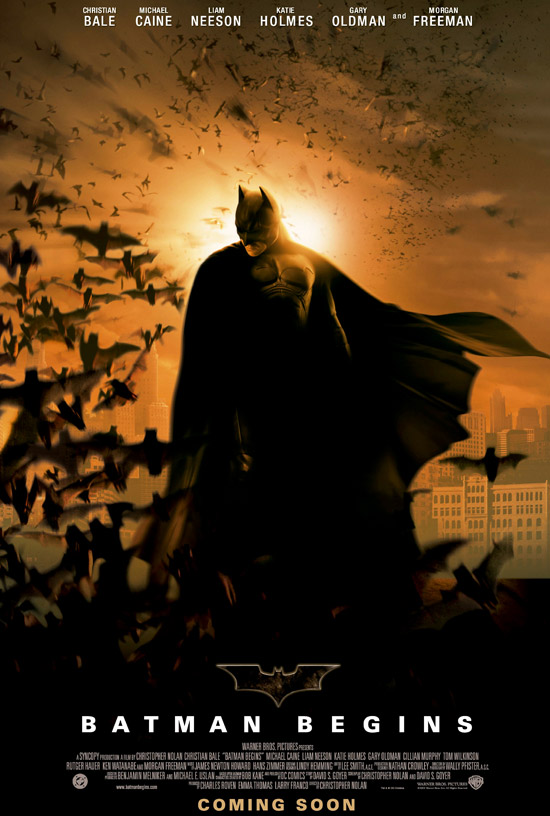
Miller's legacy has been ambivalent at best. Reflect on the fact that his rise, like that of Alan Moore, coincides with the total failure of comics to produce any new characters with mythic resonance. Miller and Moore's 'maturity' corresponds with comics' depressive and introspective adolescence, and for them, as for all adolescents, the worst sin is exuberance. Hence their style is deflationary, taciturn: consider all those portentous pages, stripped of dialogue, in which barely anything happens, and contrast them with the crazed effervescence of the typical Marvel page in the 60s. Miller's pages have all the brooding silence of a moody fifteen-year old boy. Don't be in any doubt, people: the silence signifies.
M and M traded on a lack of confidence that had begun to cloud the medium and on a disingenuous male adolescent desire to both have comics and to feel superior to them. But their demythologization, inevitably, produced only a new mythology, one that poses as more sophisticated than the one it has displaced but is in fact an utterly predictable world of 'moral ambivalence' in which 'there are only shades of grey'. Read all those puff pieces on Sin City and weep. If I have to read ONE MORE Sin City review that starts like this: 'Thought comics were only about square-jawed super-types who wear their underwear outside their tights? Think again...' No, no, no: thanks to Miller and his ilk, when we think of comics now the associations that come to mind are raddled alcoholics, corrupt cops and crack whores. It's about time that Miller stopped being congratulated for bringing into comics a noir-lite cartoon nihilist bleakness that has long been a cliche in films and books. The 'darkness' of this vision is in fact curiously reassuring and comforting, and not only because of the sentimentality it can never extiripate. (Miller's 'hard-bitten' world reminds me not so much of noir, but of the simulation of noir in Potter's Singing Detective, the daydream-fantasies of a cheap hack, thick with misognyny and misanthropy and cooked in intense self-loathing.)
The idea that there is no Good is one of the central assumptions of what we might call Capitalist Realism. Capitalist Realism insists on the irredeemability of human beings, the impossibility of Justice, the inevitability of corruption ... It's hardly surprising that this model of realism came to the fore in comics at the time when Reaganomics and Thatcherism were presenting themselves as the only solutions to America and Britain's ills.
So it is gratifying that Batman Begins is not about 'shades of grey' at all, but rather shades of white. It is a film not about amorality and Evil, but Good. In many ways, it is the film that Zizek wanted Revenge of the Sith to be: a film, that is to say, which dares to hypothesize that Evil might result from an excess of Good.
Nolan has dispensed with Burton's psychotherapeutic Soap Oprahisms (Joker falls in a vat of acid, so immediately wants to take over zeee vooorld) in favour of a modern psychoanalysis that might have come out of the pages of Zupancic's Ethics of the Real.
There's just enough of the American Psycho in Bale's troubled performance as Bruce Wayne to give it a slightly disturbing quality. Wayne is haunted by an superfluity of fathers (and a near absence of mothers: I don't think that his mother says a word). First, there is Thomas Wayne, a rose-tinted, soft focus moral paragon, the very personification of philanthropic Capital, the 'man who built Gotham' (but not without building his own sim-Brit aristocratic pile outside the city limits too). The structural delusion here (and it is a delusion shared by our own glorious leaders) concerns the separating out of rampant crime from Capital, as if there were no causal link between the former and the latter.
In keeping with the Batman myth established in the 30's comics, Wayne Senior is killed in a random street robbery, surviving only as a moral wraith tormenting the conscience of his orphaned son. Second, there is R'as Al Ghul, Wayne's hyperstitional mentor-guru. The young Wayne is convinced that his father's death is his fault, but Al Gool tries to convince him that his parents' death is his father's responsibility, because Wayne Pere did not know how to Act.... Wayne is not acting out a Hamlet-like version of the Oedipus complex, so much as he is tormented by the oscilation between two Oedipus complexes: the first in which the mighty Father is a moral exemplar who must be avenged but who cannot be equalled; the second in which the father is a weak-willed failure, 'the old man at the crossroads'. He is aided in this conflict by Michael Caine's Alfred, the 'maternal' father figure who offers the young Bruce unconditional love.
The struggle between Fathers plays out as a conflict between Fear and Justice. Fear, as wielded by the Miller-invented crime boss Falcone and the superbly chilling Scarecrow with his - get this - 'weaponized hallucinogens' (the scenes in which Scarecrow tries these little tricks out are creepily, vertiginously psychotic), and Justice, which, as the young Wayne learns, is something more than revenge. The question R'as Al Ghul poses to Wayne is: are you, with your conscience, your respect for life, too weak-willed, too frightened to do what is Necessary? Can you Act? Wayne is forced to decide: is Al Ghul what he claims to be, the ice cold instrument of impersonal Justice, or its grotesque parody? The ultimate Evil in the film turns out to originate from Ghul's excessive zeal, not from some hoaky diabolism.
Fear and Trembling, indeed. As with Russell T Davies' Dr Who (Rose in the last episode: 'he showed another way to live, a better way'), Batman Begins restores to the hero an existentialist drama that finally puts to flight the niggling, knowing sprites of PoMo that have sucked his blood for way too long. Suddenly, Decision, not citation is central. Katie Holmes (who, it has to be said, has a television rather than a cinema face) might not be wholly convincing as the DA's assistant-cum-Wayne love interest, but she gets the film's best existentialist slogan: 'It's not who you are inside that counts, it's what you DO that makes you what you are.' (A sentiment that couldn't be less in step with US therapy-hegemony.)
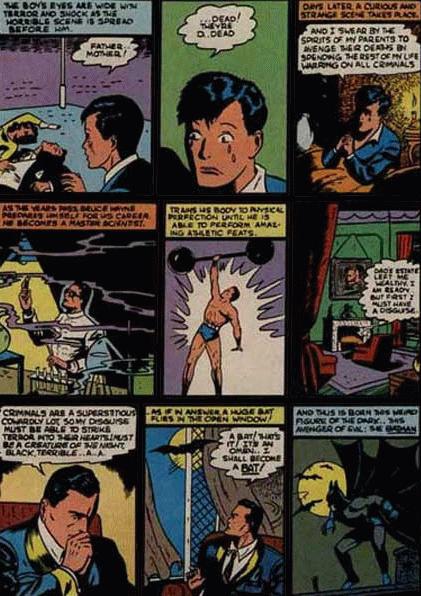
From the start, the Batman mythos has been about the switching of Gothic Fear into heroic Justice. As Kim Newman establishes in an informative piece in this month's Sight and Sound, Batman has always been a Gothic hero. Batman is deeply rooted in the pyschogeography of an American Gothic steeped in Expressionist Europe: Wayne Manor is a clear echo of Poe's rambling aristocratic mansions, while Wayne's conviction that he must 'become a creature of the night' is, as Newman says, a reference to both Bela Lugosi's Dracula and to The Cabinet of Dr Caligari ('you must become Caligari!')
Nolan's revisiting of Batman is not a re-invention but a reclaiming of the myth, a grand syncresis that draws upon the whole history of the character. It is serious without being portentous, possessed by a lightness that doesn't come close to flirting with postmodern knowingness (the few, very few, one-line quips are notable for the way they do not fit with the overall tone at all). Even Gary Oldman is - no word of a lie - understated.
All this, and, at the end of the film, the Arkham Asylum inmates are still on the loose...
__________________________________________________________________
UPDATE: fascinating email from reader Elizabeth Kaspar added as a comment below. Amongst other things, Elizabeth tries to defend Batman Forever - on grounds of its depiction of class war no less! It's always good to have critical commonplaces questioned, even if you end up reaffirming them.
UPDATE 2: Well-argued piece here completely refuting my view of the BB. Interesting question: 'is anyone ever going to let [Batman] be a detective instead of a kinkier James Bond?'
June 20, 2005
Opinionism and liberal irony

Stupid photos of stupid columnists: 2nd in a series
The modern Church of England has been accused of many things - dithering, incoherence, irrelevance - but I'll wager it is some time since it has been compared to the ideologues of a totalitarian regime. Step forward Rod Liddle in this bizarre piece in the Sunday Times today.
I don't want to dwell on Liddle's own well-known dubious personal and professional morality (to do so would to be to trade in the ad hominem muck-raking that too often substitutes for ethical debate in this country) nor to engage point for point with the slew of fallacies in his article today (enter into the vortex of the Brit pontifitariat and you'll never emerge, which surely is what the forces of reaction want, that the war be fought on their territory and their terms). However, certain features of Liddle's piece are worth singling out because we see the values of the existing order laid bare in them.
I have no wish to defend the bewildered Rowan Williams; far from it. What is worthy of attention, though, is Liddle's reason for attacking the archibishop. What particularly irked Liddle was Williams' idea that the press should promote the public good. 'The press is here, the archbishop said, to nourish the public good. Not to inform or entertain — but to nourish the public good. Now, where have I heard this before? It was an argument eloquently advanced by Georgi Plekhanov, the proto-Soviet theorist, the first Russian Marxist and the man whom we have to thank for, among other things, dreary socialist realism in art and, for daily reading matter, Pravda.' Liddle would have us believe that a notion that 'there is a commonly agreed public good that we are beholden to preserve and advance' 'underpins the ideology of pretty much every totalitarian state that sprang up during the 20th century'.
Let's leave aside that mainstay of liberal debate, the tiresome equivocation of the Soviet state with Nazism, i.e. the positing of totalitarian bogeyman waiting at the door and under the bed unless you rigorously maintain a vigilant commitment to sophistry and scepticism at all times. Look what will happen if you stop being like us. What is particularly worthy of note is the idea both that any concept of the public Good is totalitarian and that the real evil of totalitarian regimes lay in their positing of a general Good. Once again, we must resist the temptation to personalise this (i.e. Rod wants to reject any concept of the general Good because he wants the right to betray and humiliate women in the privacy of his own home) and consider the ideology that speaks through Liddle.
Note that the idea that there is a Good which is not generally agreed upon is unthinkable in this ideological configuration. What is monstrous about the Soviet state and the Church of England is that they 'assume' that 'we all share a common belief in what constitutes public good'. Surely neither the Soviets nor the Church made any such assumption. For both, the Good is precisely not coincident with populist feeling; 'democratic consensus' cannot make fundamental ethical principles invalid. The Terrors that Liddle so abominates only make sense if there is a perceived discrepancy between popular values and the Good, and it is assumed that human souls can be engineered so that they will come to recognize (and ultimately produce) this Good. This discrepancy is not a feature of totalitarian thinking alone; on the contrary, it is the cornerstone of any worthwhile ethical theory. Enlightenment thinkers such as Spinoza and Kant made no concessions to the pathologies of the rabble. They fully embraced the idea that there is an absolute difference between 'is' and 'ought', that the Good is to be opposed, and opposed fundamentally, to worldliness. Liddle, however, is situated squarely in the British empiricist tradition. Goodness is not abstract or conceptual, but something we derive from experience, so that 'we trust and believe in each other because we learn to trust through experience, not on a whim or through an article of faith.' This is as far as can be imagined from Anne Frank's idea that there is a spark of goodness in anyone. Frank's conception of Good was not an empirical hypothesis capable of refutation but a statement of faith that was literally counter-factual, against the factual, the experiental.
The ideology that speaks through Liddle has total disdain for faith because having faith means having a commitment, a fundamental project. Whereas Liddle, like Aaronovitch and most every other columnist in the British hack pack, demands the right to 'debate'. This is the vacuous non-faith to which Liddle and his ilk pledge allegiance; 'arguably,' he says, 'the most valuable thing we in the liberal West possess is a fervent disagreement about what is good for us as a society.' But there is an inevitable paradox about this that Nietzsche was perhaps the quickest to identify and analyse. How can you make a fundamental commitment of your lack of fundamental commitment? What is left in this situation is the blandly terrifying blankness of the Last Man, the armchair critic at the end of history, engorged on a surfeit of awareness of the past and of cultural difference, unable to commit and to believe even if he wanted to. That is why a skilled reactionary reader of Nietzsche like Rorty is forced to make reflexive 'irony' a positive and indeed essential feature of his post-political, post-ethical liberalism. Fukuyama was a thinker broadly in tune with Rorty's liberalism, but his positing of the 'Last Man' as the inevitable cultural expression of the capitalist end of history is in fact almost a Marxist desublimation of the supposedly ethical basis for Rorty's arguments (we must be liberals, otherwise we would be cruel). Liberal irony is a requirement of capitalism, a side-effect of the economy. And of course there can be no real 'fervent disagreement' about the Good if it is already decided that any absolutist conception of the Good is totalitarian, if that is to say there is a concealed commitment to a meta-ethical position that values the sheer fact of having an opinion over anything else.
June 17, 2005
Parish announcements
The Goth reappraisal continues here, with comments from IT here. And (via IT): 175 different types of Goth.
Also, for those few who ain't seen em: typically fascinating follow-ups and tangents from the Blissblogga on Goth here and on capitalism and bi-polarity here and here.
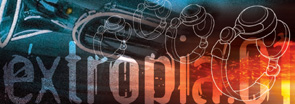
A report of the Maffia/ATP night at Whore Cull: speaking of which, there is a Cinestatic club night next week. Lots of boys doing stuff (but no Infinite Thought :-( ). For full details, have a look a the Cinestatic homepage.
Fantastic piece by Danny Baker on his 1981 meeting with Michael Jackson in The Times.

Finally, here's what I did on Monday night. The moral of that story: when Woebot recommends an event, go!
June 15, 2005
The Observer magazine just about sums him up, E.g. self-satisfied, smug

Stupid photos of stupid columnists: 1st in a series
Lenin rightly draws attention to the chorus of stupidity issuing from smugonaut central in response to Charlotte Street's well-justified (and well-argued) analysis of the inane droolings of smugonaut-in-chief, David Aaronovitch. The passage from Kristeva which Lenin cites suggests that anti-intellectualism is not unique to Britain, but the level of anti-intellectualism in Britain is surely higher than almost anywhere else. It scarcely seems credible, for instance, that a petit-bourgeois dunce like Aaronovitch would get a regular column on a broadsheet newspaper in any other European country.
Readers outside the UK might like to take a read through these 'comments' to get a sense of the intellectual climate here. I thought Badiou's description on Friday of the attacks on Derrida after his death as 'Texan' was a little cheap, partly because it is surely Britain which is the world capital of proud anti-intellectualism. Contra Chirac, here's nothing inherently 'Anglo-Saxon' about neo-liberalism (just as there is nothing inherently 'European' about Statist protectionism); if there is an Anglo-Saxon sensibility, though, it is manifest in the disdain for theory, an empiricist distrust of any discourse not conducted in the language of 'plain speaking common-sense'.
What marks this out as definitively petit-bourgeois is not the ignorance itself, but the will to ignorance. Of course, Mark's piece is perfectly clear; almost certainly the sneerocrats are well aware of the meaning of a 'Barthesian mytheme'. The point, though, is they have to pretend that they don't. The comment, 'By 'eck we never 'ad those in Bolton when I were a lass' is especially revealing. The - parodied but identified-with voice is that of a working class Other, the Other who does not know. It is is this - defiantly ignorant - Other who is the figure to whom anti-intellectual derision must appeal. Needless to say, this Other is the product of anti-intellectual discourse, the fantasy figure around which it is structured.
The ruling class project - in pop cultural terms, you can see it at work in Mclaren's treatment of John Lydon in the 70s, and in Endemol's manipulated image of the working class as drunk idiots on Big Brother now - has always been to flatten out the working class into thoughtless, bovine zombies, whose uneducated 'authenticity' and 'honesty' are to be both feared and revered. There is no doubt that Blairism has continued and exacerbated the Thatcherite trend towards destruction of working class intelligence, although in truth the saddening decline in the number of working class libraries and institutions of self-education preceded both Blair and Thatcher. Yes, anti-intellectualism is to be found in those members of the working class complicit in their own oppression, but the only class interests it serves are those of the bourgeoisie.
'Do people really talk like that, even in Islington?'
Well, I couldn't speak for people in Islington - surely Blairite apologists for the existing order could tell us more about that? - but yes, yes, there are those of who really, really talk like that. And, you know what, we regard it as an achievement, too. But then again, we weren't given an expensive private education, I suppose.
(By the way, I should have thought that even anti-intellectuals would be able to punctuate properly. 'its getting ridiculous now?'. That would be 'it's'.)
_________________________________________________________________
UPDATE: This looks like it is going to be the perfect antidote for pro-Bombing smugonautics.
June 09, 2005
Fear and misery in the third reich 'n' roll
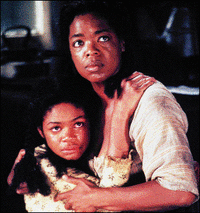 |
I (belatedly) went to see the traumatically powerful Downfall a couple of nights ago at the behest of Karl Kraft. Overhype of mediocre tat renders one suspicious of any praise surrounding contemporary films, but this is a genuine masterpiece, and one that can only be appreciated fully in the cinema environment, where the relentless pummeling of the Soviet artillery and the claustrophobic airlessness of the Hitler bunker have a crushingly visceral presence.
Downfall, actually, is the second film this year (the first was The Aviator) to flout my otherwise reliable dictum that movies based on real life are to be avoided. But the reason why both work is that they describe situations in which reality had itself gone psychotic. As Ballard has observed, the Nazi delirium was one of those moments when the distinction between the internal and the external world no longer held: hell has erupted on earth, there is no escape, no future, and you know it...
Downfall is fascinating because it closely and I'm assuming meticulously documents the 'line of abolition' that Deleuze-Guattari claim is constitutive of Nazism. For Deleuze-Guattari, who borrow the idea from Virilio, the Nazis' scheduled auto-annihilation - 'if are defeated, better that the nation should perish' - was less a forced contingency than the realization, the very consummation, of the Nazi project. Deleuze-Guattari's account might be dubious empirically (it was certainly hotly contested in intense discussions last night at Towers of Infinite Thought), but the great service it provides for cultural analysis may not be the idea that Nazism is suicidal, but the thought that the suicidal, the self-destructive is Nazi.
Since at least the death of Chatterton, popular culture has found the temptation to glamourize self-destruction irresistible. The Nazis provide the definitive Twentieth Century version of this age-old Romance of Death. As Ballard noted in his essay on Hitler, 'Alphabets of Reason', the Nazis are a creepily modern phenomenon, their technicolour glamour a world away from the fussy frock-coated figures of the Edwardian British ruling elite. The Nazis' facility with broadcasting laid the groundwork for the media landscape we now occupy. Hitler as the first rock star?
Downfall takes us through the scenes in which the Nazi party disintegrates only for the Third Reich 'n' Roll to begin. The death of the frontman is the blood-sacrifical rite that will guarantee a hideous immortality. Hitler was the first Twentieth Century figure to pass from historical individuality to becoming a permanent archetype-artifact in the the McLuhan-Ballard media unconscious. After him, Kennedy, Malcolm X, King, Morrison, Hendrix, Curtis seem local, particular, whereas Hitler comes to stand for a general principle, for modern Evil itself.
As spectators of Downfall, we spend most of the time in the Fuhrer Bunker, forced into an unsettling sympathy if not for the Reich's leaders than for those who were loyal to them, the secretaries and functionaries who admired, by no means fanatically, Hitler and National Socialism. Meanwhile, the glimpses we have of the Berlin above show a landscape out of The Triumph of Death, a city devolving into total anomie: child conscripts, vigilante hangings, intoxicated reveling, carnivalesque sexual excess.
While those scenes play out, you can almost hear Johnny Rotten leering, 'when there's no future how can there be sin?' (Although for Germany, in fact, there was nothing but the future: immediate postwar Germany was subject to a willed amnesia, a disavowal of cultural memory). It's no accident that post-punk in many ways begins here. As the Pistols pursue their own line of abolition into the scorched earth nihilism of 'Belsen was a Gas' and 'Holidays in the Sun', they keep returning to the barbed-wire scarred Boschscape of Nazi Berlin and the Pynchon Zone it became after the war. Siouxsie famously sported a swastika for a while, and although much of the flaunting of the Nazi imagery was supposedly for superficial shock effects, the punk-Nazi connection was about much more than trite transgressivism. Punk's very 1970s, very British fixation on Nazism posed ethical questions so troubling they could barely be articulated explicitly: what were the limits of liberal tolerance? Could Britain be so sure that it had differentiated itself from Nazism (a particularly pressing issue at a time that the NF was gathering an unprecedented degree of support)? And, most unsettling of all, what is it that separates Nazi Evil from heroic Good?
Downfall poses that last question with a real force, and it is a question that has a special resonance at the moment given Zizek and Zupancic's theory of the ungrounded Act as the very definition of the ethical. As I watched the most 'monstrous' act depicted in the film, Frau Goebbels' drugging and then poisoning her children - better this 'redemption', she reasoned, than that they be left in a world without National Socialism - I was struck by the parallel with Sethe in Toni Morrison's Beloved, who kills one of her children rather than let it fall into the hands of the slavers. What is to separate Frau Goebbels' act of abominable Evil from Sethe's act of heroic Good? (Those who have read The Fragile Absolute will remember that Zizek uses Sethe precisely as an example of a Good entirely alien to liberal morality, with its ethic of enlightened self-interest).
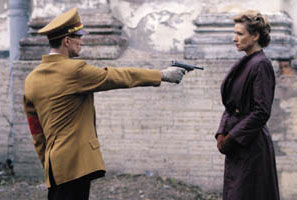
Downfall seems to invite us to sympathise with the 'liberal Nazis', the 'reasonable' doctor, for instance, who wants to keep the medical services running and is disgusted and aghast at the 'senseless, suicidal' behaviour that results from seeing Duty through to the end; the General who wants to end the war to protect the lives of civilians. But these 'pragmatic humanitarian' figures are the least defensible because they are not prepared to follow the principles of their actions to the end (if they were committed to Nazism, why not die for it? If they weren't , why not resist it?) Strangely, it is almost as if the film seems to suggest that what was irredeemably malevolent about the Nazis was their will to die for the cause.
In spite of ourselves, we find ourselves thinking that the Evil Nazis - those who totally identify with the Nazi project and who destroy themselves when it is clear that has failed - attain a certain tragic heroism by refusing to give up on their fundamental commitment. All of which leads us back to the old question: does the Kantian emphasis on unconditional duty legitimate Nazi Evil?
Zupancic, who has done so much to re-discover Kantian ethics from the perspective of Lacanian theory, addressed this question in her interview with Cabinet magazine.
'Recall that, in Hannah Arendt's famous example, Nazi functionaries like Eichmann took themselves to be Kantians in this respect: They claimed to act simply on principle without any consideration for the empirical consequences of their actions. In what way is this a perversion of Kant?
This attitude is "perverse" in the strictest clinical meaning of the word: The subject has here assumed the role of a mere instrument of the Will of the Other. In relation to Kant, I would simply stress the following point, which has already been made by Slavoj Zizek: In Kantian ethics, we are responsible for what we refer to as our duty. The moral law is not something that could clear us of all responsibility for our actions; on the contrary, it makes us responsible not only for our actions, but also—and foremost—for the principles that we act upon.'
Is this enough, though to distinguish Goebbels from Sethe? Was it really the case that Frau Goebbels was making herself into 'a mere instrument of the Will of the Other'? Or had she freely chosen to assume responsibility for her actions and for the principles on which she acted? Remember that Kantian freedom consists in choosing to obey the moral law. To be motivated by anything other than 'duty' is to be driven by 'pathological' passions, and hence not to be free at all. There is no obvious pathological motivation for Frau Goebbels' actions. She stood to gain nothing from this act of 'destroying what is best in her' (and indeed, shortly after she killed her children, she consented to be shot by her husband).
The only answer you are left with is that the Nazi Cause is itself a pathology. By definition, the Nazi Act cannot be universal, since it is based upon preserving - if only, at the end, at the level of myth - the particular pathological characteristics of 'a chosen people' and, more abstractly therefore, of defending the very principle of 'ethnic pathology'. Sethe's abominable act in Beloved is an act of Unplugging from a social situation fatally, totally corrupted by a lethally imbecilic racial delirium; Frau Goebbels' multiple infanticide, by contrast, is an attempt to hardwire herself and her children into an ethnocidal madness that can only live through their deaths and the deaths of millions of others.
October 6, 1979: Capitalism and Bipolar disorder
 | 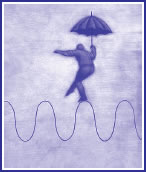 |
Realism has nothing to do with the Real. On the contrary, the Real is what realism has continually to suppress.
Capitalist realism, like Socialist realism, is about 'putting a human face' on and naturalizing a set of political determinations. The komissars of kapital like to pose as tough-minded pragmatists who tell unpalatable truths and who alone are capable of facing up to the harsh 'realities' of the world. Yet kapitalism - no less in its its soon-to-take over Chinese State version than in its soon-to-collapse American model - is based upon a slew of fantasises so credulous that they are almost charming. In a powerful piece in the Independent today, Johann Hari parallels the militant complacency of the current ruling elite with the thinking of previous highly developed social groups, such as the Incas and the Mayans, which had 'committed ecocide'. 'What were Easter Islanders saying as they cut down the last tree on their island?,' Hari quotes geographer Jared Diamond asking in his book Collapse - How Societies Choose to Fail or Survive. It is grim to reflect that the answers - 'jobs not trees!' or 'technology will solve our problems; never fear, we'll find a substitute for wood' - are precisely the rationalizations that a thanatropic drive would produce in order to do its work. In the unconscious, Freud says, no-one really believes they will die, and this is no doubt also true of civilizations, which despite the melancholy monuments testifying to the demise of Maya and Easter Island, are convinced that they are the exceptions, they are the one which cannot perish.
It is easy to see what capitalist 'realism' means when you consider Blair's habitual response to appeals from the environmental lobby. Measures to rein in eco-catastrophe may well be desirable - even necessary - but they, Blair tells us with a heavy heart bursting his sleeve, are 'politically impossible'. Here, then, is capitalist 'realism': the reduction to the realm of the 'impossible' of any steps that will prevent the destitution of the human environment. For that is what 'realism' amounts to: not a representation of the real, but a determination of what is politically possible. But what is politically possible is at odds with what is physically possible, so in a sense, it is the servomechanism-agents of Kapital, not their opponents, who 'demand the impossible' now. Their fantasy of a sustainable Kapitalism carrying on, forever, without burning out the planet, is perfectly delirial.
Another insight into capitalist realism was provided last week by Marxist economist Christian Marazzi (Scuola Universitaria Professionale della Svizzera Italiana, Lugano, Switzerland) whose lecture 'Finance, Attention and Affect' at Goldsmiths was an interrogation of the meaning - and psychological, social and neuronic impact of - post-Fordism.
Christian dated the moment of the switch from Fordism to post-Fordism very precisely: October 6, 1979. It was on that date that the Federal Reserve increased interest rates by 20 points, preparing the way for the 'supply-side economics' that would constitute the 'economic reality' with which, we are now so familiar. The rise in interest rates not only contained inflation, it made possible a new organisation of the means of production and distribution. The economy would no longer be organised by reference to production, but from the side of the point of sale. The 'rigidity' of the Fordist production line gave way to a new 'flexibility', a word that will send chills of recogntion down the spine of every worker today. This flexibility was defined by a deregulation of capital and labour, with the workforce being casualized (with an increasing number of workers employed on a temporary basis), and outsourced.

The new conditions both required and emerged from an increased cybernetization of the working environment. The Fordist factory was crudely divided into blue and white collar work, with the different types of labour physically delimited by the structure of the building itself. Labouring in noisy environments, watched over by managers and supervisors, workers had access to language only in their breaks, in the toilet, at the end of the working day, or when they were engaged in sabotage, because communication interrupted production. But in post-Fordism, when the assembly line becomes a 'flux of information', people work by communicating. As Wiener taught, communication and control entail one another.
What Deleuze, after Burroughs and Foucault, called 'the society of control' comes into its own in these conditions. Work and life become inseparable. As Christian observed, this is in part because labour is now to some degree linguistic, and it is impossible to leave language in the locker after work. Capital follows you when you dream. Time ceases to be linear, becomes chaotic, punctiform. As production and distribution are restructured, so are nervous systems. To function effectively as a component of 'just in time production' you must develop a capacity to respond to unforeseen events, you must learn to live in conditions of total instability, or 'precarity', as the ugly neologism has it. Periods of work alternate with periods of unemployment. Typically, you find yourself employed in a series of short-term jobs, unable to plan for the future.
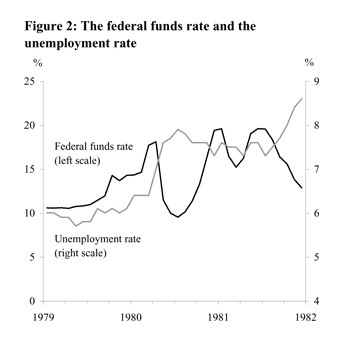
The horrors of these new working patterns are clear, but it is imperative that the Left renounces one of its most dangerous addictions, its nostalgia for Fordism. As Christian pointed out, the disintegration of stable working patterns was in part driven by the desires of workers - it was they who, quite rightly, did not wish to work in the same factory for forty years. In many ways, the Left has never recovered from being wrongfooted by Kapital's mobilization and metabolization of the desire for emancipation from Fordist routine. Especially in the UK, the traditional representatives of the working class - Union and labour leaders - found Fordism rather too congenial; its stability of antagonism gave them a guaranteed role. But this meant that it was easy for the advocates of post-Fordist Kapital to present themselves as the opponents of the status quo, bravely resisting an inertial organized labour 'pointlessly' invested in fruitless ideological antagonism which served the ends of union leaders and politicians, but did little to advance the hopes of the class they purported represented. And so the stage was set for the neo-liberal 'end of history', the 'post-ideological' ideological justification for rampant supply-side economics. Antagonism is not now located externally, in the face-off between class blocs, but internally, in the psychology of the worker, who, qua worker, is interested in oldstyle class conflict, but, as someone with a pension fund, is also interested in maximizing their investment. There is no longer an identifiable external enemy. The consequence is that, as Christian put it in a memorable image, Post-Fordist workers, are like the Old Testament Jews after they left the 'house of slavery': liberated from a bondage to which they have no wish to return but also abandoned, stranded in the desert, confused about the way forward.
The psychological conflict raging within individuals - they themselves are war - cannot but have casualties. One hidden, or at least naturalized, consequence of the rise of post-Fordism is that the 'invisible plague' of psychiatric disorders that has spread, silently and stealthily, since around 1750 (i.e. the very onset of industrial capitalism) has reached a new level of acuteness in the last two decades. This is one more dimension of the Real that capitalist realism is constitutively unable to process.
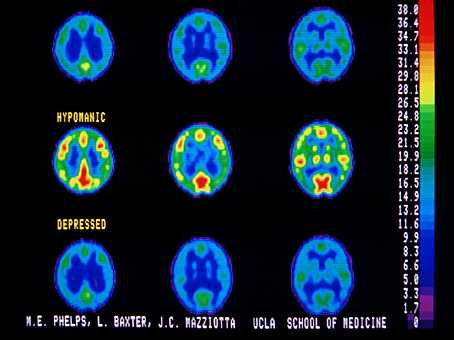
It is typical of New Labour that it should have committed itself, so early in its third term, to removing people from Incapacity Benefit, as if most people claiming the benefit were malingerers. In contrast with this assumption, it doesn't seem unreasonable to infer that most of the people claiming incapacity benefit - and there are well in excess of two million of them - are casualties of Kapital. A significant proportion of claimants, for instance, are people psychologically trashed as a consequence of the capitalist realist insistence that mining was no longer economically viable (though, even considered in brute economic terms, once you factor in the cost to taxpayers of such benefits, the arguments about 'viability' seem rather less than convincing). Many have simply buckled under the terrifyingly unstable conditions of post-Fordism.
The current ruling ontology rules out any possibility of a social causation of mental illness. The chemico-biologization of mental illness is of course strictly commensurate with its de-politicization. Considering mental illness an individual chemico-biological problem has enormous benefits for capitalism: first, it reinforces capital's drive towards atomistic individualization (you are sick because of your brain chemistry) and second, it provides an enormously lucrative market in which multinational 'pyscho-mafias' can peddle their dodgy drugs (we can cure you with our SSRIs). It goes without saying that all mental illnesses are neurologically instantiated, but this says nothing about their causation. If it is true, for instance, that depression is constituted by low serotonin levels, what still needs to be explained is why particular individuals have low levels of serotonin.
The increase in bi-polar disorder is a particularly significant development. In the discussion after Christian's lecture, I asked him about the relationship between this form of mental illness and capitalism as a system. It is clear that capitalism, with its ceaseless boom and bust cycles, is itself, fundamentally and irreducibly, bi-polar. Capitalism is characterized by a lurching between hyped-up mania (the irrational exuberance of 'bubble thinking') and depressive come-down. (The term 'economic depression' is no accident). To a degree unprecedented in any other social system (and capitalism is very precisely NOT a social 'structure' in the way that the despotic state or the primitive socius are), capitalism both feeds on and reproduces the moods of populations. Without delirium and confidence, capital could not function. As it happened, Christian confirmed that he had in fact been working with people who had been 'psychologically smashed' by capitalism, many of whom, it turned out, had in fact developed bipolar disorder. It could hardly be denied that there is an isomorphic relationship between the social and individual disorders of capitalism.
How could madness not result when we are invited to consider America's consuming of $600 billion a year more than it produces 'realistic'? (As opposed, so we are told, to Europe's 'unrealistic' social welfare programmes.) Make no mistake, the realists are insane, which more than ever reveals the force of the slogan, 'the Real is the impossible, but the impossible which happens'. Ecological catastrophe and mental illness are present in capitalism's wrap-around simulation as warps, unassimilable discontinuities, that which cannot be but which, nevertheless, cannot be extirpated. Perhaps these negative Reals - these dark shadows which allow us to see kapital's striplit mall of the mind for what it actually is - have their complement in a positive Real, an event completely inconceivable in the current situation, but which will break in and re-define everything.
June 06, 2005
Soviet goth (slight return) and other superhero stories

Reader Bas VanHoof unites two current themes - comics and Soviet goth - by drawing my attention to the great comic artist's Enki Bilal's Partie de Chasse, which, according to Bas, has 'both has a soviet and a gothic feel'.
Some pages from the original comic are reproduced here, and it seems that an English version is now available.

Speaking of the Soviet comics connection (and of superheroes I fancied/ identified with), we must mention Black Widow, a former Soviet spy, who, sadly, defected and became an agent of SHIELD. (It seems that there is to be a Black Widow film.)
Other superheroes well worth a mention are the animate-inanimate couple Scarlet Witch and The Vision: a witch married to a 'synthetic human'.
Meanwhile, Northanger cites the following moronism (quoted from this site): "I have never liked black superheroes and I don't really think that they are believable. I didn't mind the Kingpin being black in the DAREDEVIL movie because he's a villain. I don't want to relate to or care about the villains, only the heroes. I know that this may sound like a racist statement but look at the society that we live in. If you look at the majority of crimes and lawlessness in this country most of it is caused by African-Americans. The kind of movies, television and music they endorce [sic] is full of violence, drug use, abusing women, attacting [sic] law enforcement officers, rape and murder. That's really all that needs to be said."
Northanger goes on to observe that 'black people, when i was growing up, were not superheros' and 'when i was growing up the people that looked like me were washing dishes.' The Museum of Black Superheroes lists a number of black heroes, but few are iconic, most are forgotten. In addition to the previously mentioned Black Panther - the breakthrough black superhero, although the break was not followed by a proliferation of black heroes, to say the least, and it took 11 years for the Panther himself to get a short-lived run of his own book - perhaps only Luke Cage attained any degree of recognizability. I first remember seeing the jive-talking 'hero for hire' Cage battling Spiderman, and he had his own title, and a 'presence' throughout the Marvel universe; it seems that he, too, is to be the subject of film.
The shortage of black heroes is in direct disproportion to the impact that Marvel in particular has had upon black music. From Wu Tang through to Doctor Octagon and Underground Resistance, black music has been saturated with references to the superheroic.
I'm leaving out Falcon, who, as a sidekick of Captain America, was worse than neglible. Which brings me to the answer to the question posed in the expanded version of the meme, namely 'Which superheroes did you hate?' Captain America provoked detestation in me from a young age; not so much for his stars 'n' stripes patriotism as his square jawed patriarchal moralism (something for which I also loathed Reed Richards). Although when Jack Kirby drew the not-so good Captain, he did look fantastic, of course.
June 03, 2005
UBERHERO MEME
My answers to the superhero meme, sent this way by the great Lenin. (With scans from comics in my very own collection!)
If you could have one superpower, what would it be and why? (Assume you also get baseline superhero enhancements like moderately increased strength, endurance and agility.)
Retractable claws, like Molly Millions from Neuromancer (another cybergothic heroine as it goes) and Wolverine.
Which, if any, 'existing' superhero(es) do you fancy, and why?
Storm. She's a black goth with power over the elements ... 'Nuff said.
OK, here's the tough one. What would your superhero name be? (No prefab porn-name formulas here, you have to make up the name you think you'd be proud to mask under.)
Death Drive.
For extra credit: Is there an 'existing' superhero with whom you identify/whom you would like to be?
Pass it on. Three people please, and why they're the wind beneath your wings.
'Wind beneath my wings', yeuch.... but....
Infinite Thought, because I want to see if her superhero can combine Soviet Goth with pixiedom; Baal, because whatever he writes is charged with poetic illumination, and it's long past time for him to write something new; top shoe fetishist Glueboot, because I want to see the costume design.
The dreams are already sold
'You might as well try and enjoy it, because it'll probably be ten years before we play again,' Mark Stewart notes dryly towards the end of the Maffia's set tonight.
It must be seventeen years since I last saw the Maffia actually, but the first time was the best. 1987, the Astoria Charing Cross Road; we arrived on the train from the provinces intrigued but scarcely able to imagine how something like As the Veneer of Democracy Starts to Fade could be rendered live. In the event, the Maffia's toxic metal p-funk, shredded and panned by Adrian Sherwood's mix and lightning-conducted through the gangly figure of the ranting and raging Stewart - a personification of all the excessive, 'embarrassing' political-libidinal demands Thatcherism had already, over a long, long eight years, water-tortured out of us - was the stuff of the most visceral of conversions. I came out delirious, hooked, forever a fan. But even then, with C86 in the ascendant, Stewart seemed to belong to an older, superceded age, one in which independent pop could articulate - both formally and conceptually - another way, an outside, a discontent with the reality principle itself.
That disjunction - between Stewart and his surrounding milieu - is felt even more keenly than ever tonight. The Maffia will play 'Liberty City' , the song that will for me always be the best account of what it was to feel, gradually, the bitter bite of 'methodological individualism' in the eighties, the sense of being atomised in the lonely crowd, abandoned in the virtual nuclear winter of the collapsing social wherein all possibilities of collectivity withered one by one, and the pitiful remains of an abandoned public space became subject to casual vandalism and predation. Reality shrank down to a banal survivalism, ('struggling to pay the rent the main worry's job security') counted out in the normalising pressures you become subject to when the best you can hope for is the right to maintain your own beautifully appointed prison cell. It's about the impossibility of connection, reaching out to friends who are either embittered or broken. You feel ill? It's not just you.....
Today, the scenario 'Liberty City' spraypainted is taken for granted, not even an issue. What could it even mean to expect anything else? Tonight that's an insuperable problem because the Maffia inferno can only ignite if the pain, the anger, the disappointment, the anxiety Stewart channels are there in the crowd to be fanned and fuelled. If that is to say, there is some possibility of a circuit of affect, or better, dis-affect between crowd and band. In those conditions, the Maffia alchemy could transform tribulation into exultant ego-dissolution, punk and metal nihilism into a funk celebration.
But that could not happen tonight. The crowd lacks any cohesion, what you might expect when four or five rather disparate acts are pushed into the same bill. 'Here we are now, entertain us'. But the Maffia aren't for idle passers by. A stream of latecomer lager-lads shove past (are these fuckaz hired by someone to ensure all shows in London are mean, miserable territorial wars?) , barely interested but convinced that they have the absolute right to the best view of the Spectacle, no matter how many folk they have to trample over to get it. My Latin temper snaps, and I'm censured by a security guard. This is like being in a bus queue. One of the shovers spits in I.T.'s hair.
The Maffia probably play as well as they ever have. 'Forbidden Colours' is done as a fragile ballad blasted by artillery shells of Leblanc percussion and radioactive washes of reverb. But for the most part - on the rallying cry for the dispossessed that is 'Resistance of the Cell', on the brutalist-funk sexual deprogramming of 'Hypnotized', on the straining against the limits of the acceptable of 'Hysteria' - they are a vicious, viscous, adrenally-wired riff-machine (imagine the Stooges passing from 'being funky' into actually playing funk) powered by the heaviest of vintage Tommy Boy beats. Stewart's vocal, reverbed and distorted into a Munch scream, a strangled Dalek screech, is still the Artaud howl he started to use nigh on three decades ago on the earliest Pop Group recordings.
But tonight it doesn't connect like it should. I can't get to Now. Two people in front of me are incessantly chatting (what is it that makes people pay 18 quid for a ticket only for them to jabber constantly?) There are pockets of rapt dancing, but far too much dissolute milling about. No crowd dynamics.
Stewart looks disconsolate, isolated. I sympathise.
Tonight, London 2005 seems sullen, indifferent.
Later, an hour or so after the set has finished, we spy Stewart standing just behind us. I want to say something, but before I can, he's gone.
I doubt I'll ever see him play live again.
June 02, 2005
Soviet goth

Speaking of coldness and couture: check out the new weblog by Owen Hatherley of Dissensus. Owen reproduces parts of his essay on 'bachelor/ machines: futurism, austerity and sexuality' as well as two pieces that previously appeared in the zine 'Totally Bored': an interview with Jeremy Junior Boys and a little driftwerk on London. Read 'em, and if we're lucky, he'll write more.
The art-fashion culture wars of the early part of the 20C - the aesthetic-theoretical struggles between futurism, vorticism, cubism and constructivism - have never ceased to be relevant. Unfortunately, fascism seems to have won, laying claim to both sexiness and futurism. I am going to discuss constructivism and its relationship to glam and communism in a later post, but, for the moment, I.T. and I are doing our bit to destroy fascist chic by trying to start a trend in Soviet Goth.
June 01, 2005
FOR YOUR UNPLEASURE: THE HAUTEUR-COUTURE OF GOTH

Ridiculed, forgotten, yet subterraneanly robust, Goth is the last remnants of glam in popular culture.
Goth is also the youth cult most associated with women and with fiction. This is hardly surprising. As I have pointed out before and is well known, the novel has its origins in 'gothic romances' which were predominantly consumed and produced by women, and the complicity of women with the Gothic has been a commonplace of literary criticism at least since Ellen Moers wrote her classic essay, 'Female Gothic', in 1977.
Why think about Goth now?
Partly it is because Goth's preposterous trash-aristocratic excess couldn't be more at odds with contemporary culture's hip hop-dominated sportswear brutilitarianism. At thes same time, though, Goth's shadow seems unusually visible in pop culture at the moment, what with references to it in both Coronation Street ('you're not even a proper Goth!') and Big Brother ('what is a Gothic? Can you make me into one?')
Partly it is because Rip It Up has revived fascination in all things post-punk, and Goth is the last surviving postpunk cult. These two facts have resulted in I.T. and me seceding from the oppressive masculinist cool of the club into the more congenial cold of Goth haunts.
Goth has its own version of more or less every other youth culture (hence there's techno Goth, Industrial Goth, Hippie Goth...) But let's leave aside the male abjects (The Cramps, The Birthday Party), the po-faced (the overwrought white dub of Bauhaus) and the po-mo (The Sisters of Mercy, who from the start traded in a self-conscious meta-Goth), and start with Siouxsie.
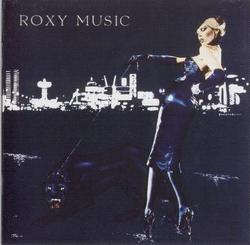 |  |
It is well-known that the Banshees were formed as a result of the future Siouxsie and Severin meeting at a Roxy show in 1974. (Which fact was repeated in this really rather bizarre piece on Roxy in last Friday's Guardian, which pursues the postmodern rock critical trend to equate 'importance' with 'influence' far past the point of self-parody, relegating actual discussion of Roxy's output to a paragraph or so before launching into a survey of groups they inspired). So, unlike the Birthday Party, who were famously disgusted when they arrived in London to find it dominated by New Romantic poseur-pop , the Banshees belonged to an art pop lineage which had a relationship to music which was neither ironically distant nor direct. For all their inventiveness, for all the damage they wreaked upon rock form, The Birthday Party remained Romantics, desperate to restore an expressive and expressionistic force to rock; a quest which led them back to the Satanic heartland of the blues. (If women want to understand what it is like to be the afflicted subject of male sexuality - I wouldn't necessarily advise it - there's no better fast-track to 'what's inside a boy' than the BP's 'Zoo Music Girl' or 'Release the Bats'). By contrast with this carnal heat, the early Banshees affected a deliberate - and deliberated - coldness and artificiality.
Siouxsie came from the art rock capital of England - that zone of South London in which both David Bowie (Beckenham) and Japan (Catford, Beckenham) grew up. Although Siouxsie was involved with punk from the very beginning, and although all of the major punk figures (even Sid Vicious) were inspired by Roxy, The Banshees were the first punk group to openly acknowledge a debt to glam. Glam has a special affinity with the English suburbs; its ostentatious anti-conventionality negatively inspired by the eccentric conformism of manicured lawns and quietly-tended psychosis Siouxsie sang of on 'Suburban Relapse'.
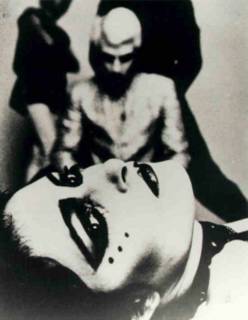
But glam had been the preserve of male desire: what would its drag look like when worn by a woman? This was a particularly fascinating inversion when we consider that Siouxsie's most significant resource was not the serial identity sexual ambivalence of Bowie but the staging of male desire in Roxy Music. She may have hung out with 'Bowie boys', but Siouxsie seemed to borrow much more from the lustrous PVC blackness of For Your Pleasure than from anything in the Thin White Duke's wardrobe. For Your Pleasure songs like 'Beauty Queen' and 'Editions of You' were self-diagnoses of a male malady, a specular desire that fixates on female objects that it knows can never satisfy it. Although she 'makes his starry eyes shiver', Ferry knows 'it never would work out'. This is the logic of Lacanian desire, which Alenka Zupancic explains as follows: 'The ... interval or gap introduced by desire is always the imaginary other, Lacan's petit objet a, whereas the Real (Other) of desire remains unattainable. The Real of desire is jouissance - that "inhuman partner" (as Lacan calls it) that desire aims at beyond its object, and that must remain inaccessible.' (For those, like cprobes, who are sceptical of what an ethics of the drive might look like, I recommend the outstanding essay from which this observation is taken, 'On Love as Comedy', which is an addendum to The Shortest Shadow).
Roxy's 'In Every Dreamhome a Heartache' is about an attempt, simultaneously disenchanted-cynical and desire-delirious, to resove this deadlock. It is as if Ferry has recognized, with Lacan, that phallic desire is fundamentally masturbatory. Since, that is to say, a fantasmatic screen prevents any sexual relation so that his desire is always for an 'inhuman partner', Ferry might as well have a partner that is literally inhuman: a blow-up doll. This scenario has many precursors: most famously perhaps Hoffman's short story 'The Sandman' (one of the main preoccupations of Freud's essay on 'The Uncanny' of course), but also Villier de L'isle Adam's lesser known but actually more chilling masterpiece of Decadent SF, 'The Future Eve' and its descendant, Ira Levin's Stepford Wives.
If the traditional problem for the male in pop culture has been dealing with a desire for the unattainable - for Lacan, remember, all desire is a desire for the unattainable - then the complementary difficulty for the female has been to come to terms with not being what the male wants. The Object knows that what she has does not correspond with what the subject lacks.
It is almost as if the female Goth response to this dilemma is to self-consciously assume the role of the 'cold, distanced, inhuman partner' (Zizek) of phallic desire. The glam male remained trapped in his perfect penthouse populated by dumb fantasmatic playdolls; the Goth female meanwhile roams through the roles of vamp and vampire, succubus, automaton. The glam male's pathologies are those of the subject; the Goth female's problematic is that of the object. Remember that the original sense of glamour - bewitchment - alludes to the power of the auto-objectified over the subject.
'If God is masculine, idols are always feminine', Baudrillard writes in Seduction (95), and Siouxsie differed from previous pop icons in that she was neither a male artist 'feminized' into iconhood by fan adoration, nor a female marionette manipulated by male svengalis, nor a female heroically struggling to assert a marginalized subjectivity. On the contrary, Siouxsie's perversity was to make an art of her own objectification. As Simon and Joy put it in The Sex Revolts Siouxsie's 'aspiration [was] towards a glacial exteriority of the objet d'art' evinced through 'a shunning of the moist, pulsing fecundity of organic life.' (344) This denial of interiority - unlike Lydia Lunch, Siouxsie is not interested in 'spilling her guts', in a confessional wallowing in the goo and viscera of a damaged interiority - corresponds to a staged refusal to either be 'a warm, compassionate, understanding fellow-creature' (Zizek). Like Grace Jones, another who made an art of her own objectification, Siouxsie didn't demand R.E.S.P.E.C.T. from her bachelor suitors (with the implied promise of a healthy relationship based on mutual regard) but subordination, supplication.
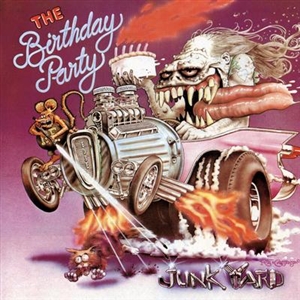
(The Goth male is all to ready to comply, although - as Nick Cave's compulsively repetitious career has graphicallly demonstrated - snivelling prostration may well only be the prelude to homicidal destruction. Grovelling in front of the Ice Queen - 'I kiss the hem of her skirt' - the Goth male is neither object nor subject but - famously - abject. The best image of this idiot lust is the slavering, pustulant monstrosity on the cover of the Birthday Party's Junkyard, and their 'Release the Bats' - a song the group came to despise because they thought it might result in their being pigeoholed as generic Goth - remains the most pulsingly compulsive dramatization of the goth abject surrendering himself to the Object of his quivering desire. Cave oscillates between worshipping his Lady's femmachinc hauteur - 'my baby is a cool machine', 'she moves to the pulse of the generator' - and pruriently drooling over the 'filth' of her flesh - 'she doesn't mind a bit of dirt'. This conforms almost perfectly with Lacan's description of the courtly Lady, whose cold abstraction is not defined by opposition with smelly physicality. Cave's abject is unable to give up on his desire, and the result is well-known: in order to continue to desire the woman, he must ensure that he cannot possess her, 'so that l'il girl will just have to go'. Only when he has made her as cold and unyielding as Ferry's 'perfect companion' or Poe's parade of beautiful cadavers, can his desire be extended 'to eternity', because then it is rendered permanently incapable of satisfaction.)
Instead of asserting an illusory 'authentic subjectivity' which supposedly lies beneath the costumes and the cosmetics, Siouxsie and Grace Jones reveled in becoming objects of the gaze. Both would no doubt have appreciated the derision Baudrillard poured upon the strategy of unmasking appearances in Seduction: 'There is no God behind the images and the very nothingness they conceal must remain a secret.' (94) Siouxsie and Jones' embracing of their objectality testifies to the fact that there is a scopic drive that cult studs whining about 'being reduced to an object' has always ignored: the exhibitionist drive be seen.
Simon is right that 'Painted Bird' (from the Banshees mistresspiece, A Kiss in the Dreamhouse) and the nearly contemporary 'Fireworks' were 'virtual manifestos for goth', but it's worth reflecting on how different these songs are in message and mood from the hackneyed image of the culture. Both 'Painted Bird' and 'Fireworks' (with its 'exultant image of self-beaufication as a glam gesture flashing amid the murk of mundanity') are not maudlin, matt black or self-absorbed, but celebrations of the colourful and the collective. 'WE are fireworks,' Siouxsie sings, 'burning shapes into the night', and you'd be hard pressed to find a song that crackles with so much enjoyment as this. The Banshees' take on Kozinski's novel Painted Bird is also about the triumph of collective joy over persecuted, isolated, individuated subjectivity. In Kozinski's novel, the hero paints one bird and when he throws it back to its flock they don't recognize it and therefore destroy it. But Siouxsie's Goths are not painted by another's hand; they are 'painted birds by their own design'. It is not the familiar tragic-heroic scenario in which an outsider, destined to lose, nevertheless makes a solitary stand against the conformist herd. The 'dowdy flock' are to be 'confounded', but by another flock, not by an individual, and the result is not frustration, but, again, jouissance - by the end of the song, 'there's no more sorrow'.
Think how different this is to the confederacy of isolation produced by Joy Division, whose functional clothes and 'non-image' implied the traditional male subjectivist privileging of the inside over the outside, depth over surface. Here was one type of 'black hole': the 'line of abolition' Deleuze-Guattari describe in 'Micropolitics and Segmentarity', the drive towards total self-destruction. The Banshees, on the other hand, were more like the 'cold stars' invoked by Neubauten: forbidding, remote, yet also the queens of a paradoxically egalitarian aristocracy in which membership was not guaranteed by birth or beauty but by self-decoration. Siouxsie's hyper-white panstick radiated the 'cold light' of stardom Baudrillard invokes in Seduction. Stars 'are dazzling in their nullity, and in their coldness - the coldness of makeup and ritual hieraticism (rituals are cool, according to McLuhan).' (96)
'The sterility of idols is well-known,' Baudrillard continues, 'they do not reproduce, but arise from the ashes, like the phoenix, or from the mirror, like the seductress.' The Gothic has always been about replication as opposed to reproduction. It's no coincidence that the female vampire was often associated with lesbianism (most gloriously in what is perhaps the definitive Goth film, The Hunger) because vampires and lesbians (like machines) present the horror (from the point of view of the phallic One) of a propagative power that has no use for the male seed. Conversely, 'female gothic' often pathologises pregancy, utilizing the language of horror to describe the gradual take-over of the body by an entity that is both appallingly familiar and impossibly alien. 'We Hunger' from the Banshees' Hyaena, with its 'horror of suckling' , fits into a lineage of female Horror which has seen 'pregnancy in terms of the appalling rapacity of the insect world' , as a 'parastic infestation' (Sex Revolts, 344).
The principal Goth vectors of propagation are, of course, signs and clothes (and - clothes as signs). The Siouxsie Look is, in effect, a replicatable cosmetic mask - a literal effacement of the organic expressivity of the face by a geometric pattern, all hard angles and harsh contrasts between white and black. White tribalism.
In Rip It Up, Simon says that the early Banshees were 'sexy in the way that Ballard's Crash was sexy', and Ballard's abstract fiction-theory is as palpable and vast a presence in the Banshees as it is in other post-punk. (It's telling that the turn from the angular dryness of the Banshees' early sound to the humid lushness of their later phase should have been legitimated by Severin's reading of The Unlimited Dream Company.) But what the Banshees drew (out) from Ballard was the equivalence of the semiotic, the pyschotic, the erotic and the savage. With psychoanalysis (and Ballard is nothing if not a committed reader of Freud), Ballard recognized that there is no 'biological' sexuality waiting beneath the 'alienated layers' of civilization. Ballard's compulsively repeated theme of reversion to savagery does not present a return to a non-symbolized bucolic Nature, but a fall back into an intensely semioticized and ritualized symbolic space. (It is only the postmoderns who believe in a pre-symbolic Nature). Eroticism is made possible - not merely mediated - by signs and technical apparatus, such that the body, signs and machines become interchangeable.
Baudrillard understood this very well, in his post-punk era essay on Crash:
'Each mark, each trace, each scar left on the body is like an artificial invagination, like the scarifications of savages [...]. Only the wounded body exists symbolically - for itself and for others - "sexual desire" is never anything but the possibility bodies have of combining and exchanging their signs. Now, the few natural orifices to which one normally attaches sex and sexual activities are nothing next to all the possible wounds, all the artificial orifices (but why "artificial"?), all the breaches through which the body is reversibilized and, like certain topological spaces, no longer knows either interior or interior [...] Sex [....] is largelhy overtaken by the fan of symbolic wounds, which are in some sense the anagrammatization of the whole length of the body - but now, precisely, it is no longer sex, but something else [...] The savages knew how to use the whole body to this end, in tatooing, torture, initiation - sexuality was only one of the possible metaphors of symbolic exchange, neither the most significant, nor the most prestigious, as it has become for us in its obsessional and realistic reference, thanks to its organic and functional character (including in orgasm).' (114-115)
As is well-known, female dis-ease in capitalism is often expressed not in an assertion of the 'natural' against the artificial, but in the anti-organic protest of eating disorders and self-cutting. It's hard not to see this - as I.T. following Zizek does - as part of the 'obsession' with 'realistic reference', an attempt to strip away all signs and rituals so as to reach the unadorned thing-in-itself. Goth is in many ways an attempt to make good this symbolic deficit in postmodern culture: dressing up as re-ritualization, a recovery of the surface of the body as the site for scarification and decoration (which is to say, a rejection of the idea that the body is merely the container or envelope for interiority).
Take Goth footwear. With their flagrant anti-organicic angularity, their disdain for the utilitarian criteria of comfort or functionality, Goth shoes and boots bend, bind, twist and extend the body. Clothing recovers its cybernetic and symbolic role as a hyperbolic supplement to the body, as what which destroys the illusion of organic unity and proportion.

LINXX
Iris Carver on cybergothic: The a-death phenomenon, Unscreened Matrix, The Unlife of the Earth.
Me on Gothic Materialism (see also my thesis obv). GM is probably the last thing I produced in the amphetamine-libidinal cyberpunk style. As is typical with that mode, there is a high degree of compression; ideas that could have been explored for (at least) a chapter are crashed through not so much like there's no tomorrow as in the cyberpunk conviction that tomorrow is already here and we have to catch up. (Much of the Ccru take on D/G was in effect a Goth remix of their corpus, editing out the hippy-drippy Bergsonian vitalism in favour of the Artaudian body without organs.)

